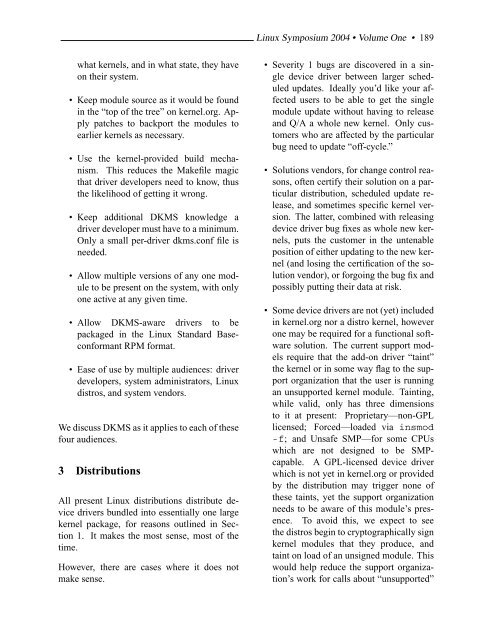You also want an ePaper? Increase the reach of your titles
YUMPU automatically turns print PDFs into web optimized ePapers that Google loves.
<strong>Linux</strong> Symposium 2004 • Volume <strong>One</strong> • 189<br />
what kernels, and in what state, they have<br />
on their system.<br />
• Keep module source as it would be found<br />
in the “top of the tree” on kernel.org. Apply<br />
patches to backport the modules to<br />
earlier kernels as necessary.<br />
• Use the kernel-provided build mechanism.<br />
This reduces the Makefile magic<br />
that driver developers need to know, thus<br />
the likelihood of getting it wrong.<br />
• Keep additional DKMS knowledge a<br />
driver developer must have to a minimum.<br />
Only a small per-driver dkms.conf file is<br />
needed.<br />
• Allow multiple versions of any one module<br />
to be present on the system, with only<br />
one active at any given time.<br />
• Allow DKMS-aware drivers to be<br />
packaged in the <strong>Linux</strong> Standard Baseconformant<br />
RPM format.<br />
• Ease of use by multiple audiences: driver<br />
developers, system administrators, <strong>Linux</strong><br />
distros, and system vendors.<br />
We discuss DKMS as it applies to each of these<br />
four audiences.<br />
3 Distributions<br />
All present <strong>Linux</strong> distributions distribute device<br />
drivers bundled into essentially one large<br />
kernel package, for reasons outlined in Section<br />
1. It makes the most sense, most of the<br />
time.<br />
However, there are cases where it does not<br />
make sense.<br />
• Severity 1 bugs are discovered in a single<br />
device driver between larger scheduled<br />
updates. Ideally you’d like your affected<br />
users to be able to get the single<br />
module update without having to release<br />
and Q/A a whole new kernel. Only customers<br />
who are affected by the particular<br />
bug need to update “off-cycle.”<br />
• Solutions vendors, for change control reasons,<br />
often certify their solution on a particular<br />
distribution, scheduled update release,<br />
and sometimes specific kernel version.<br />
<strong>The</strong> latter, combined with releasing<br />
device driver bug fixes as whole new kernels,<br />
puts the customer in the untenable<br />
position of either updating to the new kernel<br />
(and losing the certification of the solution<br />
vendor), or forgoing the bug fix and<br />
possibly putting their data at risk.<br />
• Some device drivers are not (yet) included<br />
in kernel.org nor a distro kernel, however<br />
one may be required for a functional software<br />
solution. <strong>The</strong> current support models<br />
require that the add-on driver “taint”<br />
the kernel or in some way flag to the support<br />
organization that the user is running<br />
an unsupported kernel module. Tainting,<br />
while valid, only has three dimensions<br />
to it at present: Proprietary—non-GPL<br />
licensed; Forced—loaded via insmod<br />
-f; and Unsafe SMP—for some CPUs<br />
which are not designed to be SMPcapable.<br />
A GPL-licensed device driver<br />
which is not yet in kernel.org or provided<br />
by the distribution may trigger none of<br />
these taints, yet the support organization<br />
needs to be aware of this module’s presence.<br />
To avoid this, we expect to see<br />
the distros begin to cryptographically sign<br />
kernel modules that they produce, and<br />
taint on load of an unsigned module. This<br />
would help reduce the support organization’s<br />
work for calls about “unsupported”

















